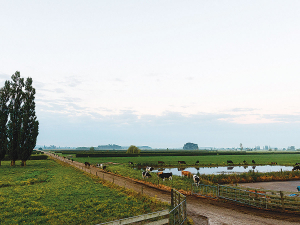Genetics, Efficiency and Performance: How the Burgesses are raising the bar at Te Poi
Bill and Michelle Burgess had an eye-opening realisation when they produced the same with fewer cows.
 DairyNZ has confirmed that a 15% stock reduction was not a recommendation of the Climate Change Commission.
DairyNZ has confirmed that a 15% stock reduction was not a recommendation of the Climate Change Commission.
OPINION: The recent Climate Change Commission discussion document has made many farmers anxious.
Quite rightly, they are keen to know what’s in store for them and DairyNZ has been fielding calls from farmers.
The Climate Change Commission was formed alongside work to set the country’s climate targets (including biogenic methane targets). The establishment of the commission is legislated under the Zero Carbon Act 2019 and its main purpose is to provide evidence-based advice on climate issues.
Under the Act, the commission is required to deliver advice on setting emissions budgets across the entire economy to government. This advice has implications for all sectors of the economy, including farming.
The draft advice released by the commission also sent rumour mills into overdrive. One ‘recommendation’ bandied about is that the advice calls for a 15% reduction in cow numbers.
DairyNZ confirms that this isn’t a recommendation made by the commission – although they did model this as a possibility in the future.
What the commission has actually recommended is the Government introduce policies that will reduce barriers to conversion to lower emission land uses. If stock numbers were to reduce, this would not be a blanket rule across all farms and would be more likely to be driven by some farmers choosing to convert to other land uses like horticulture.
Land use change, for example, from dairy to horticulture on flatter and more productive land, could reduce biogenic emissions per hectare. However, it could also cause water quality to deteriorate due to the increased use of fertiliser, and consequential nitrogen and phosphorus losses.
Nutrient losses would vary depending on the crop, the site, weather conditions, the soils’ physical and chemical properties, and how the land is managed. Increasing the area of horticulture could also increase water demand. The commission says that in light of the physical impacts of climate change, this increased need for water would need to be weighed up when considering converting to horticulture as a climate action.
The report also talks about pushing harder to get solutions from science and technology something farmers have been pushing for too.
The commission has opened public consultation on this draft advice for six weeks, from 1st February to 14th March 2021. It will then consider any submissions on the draft advice and finalise advice to the Government by 30 June, 2021.
The commission says every New Zealander will need to play his or her role to help the country combat climate change.
Farmers are ready to play their part.
Mating wrapped up last month at the across-breed Beef Progeny Test on Pāmu’s Kepler Farm in Manapouri.
Libby Judson is a keeper of memories from an age gone by. Tim Fulton tells her story.
A New Zealand-first native tree study has highlighted the Bioeconomy Science Institute's position as a forestry research leader.
Hemp fibre processor Rubisco is relocating its core processing facility to Ashburton as part of a $20-$30 million expansion to leverage what it says is an accelerating global demand for sustainable and renewable fibres.
Tradition meets some of the latest in technology at the 2026 East Coast Farming Expo.
OPINION: Trade Minister Todd McClay and the trade negotiator in government have presented Kiwis with an amazing gift for 2026 - a long awaited and critical free trade deal with India.
President Donald Trump’s decision to impose tariffs on imports into the US is doing good things for global trade, according…
Seen a giant cheese roll rolling along Southland’s roads?